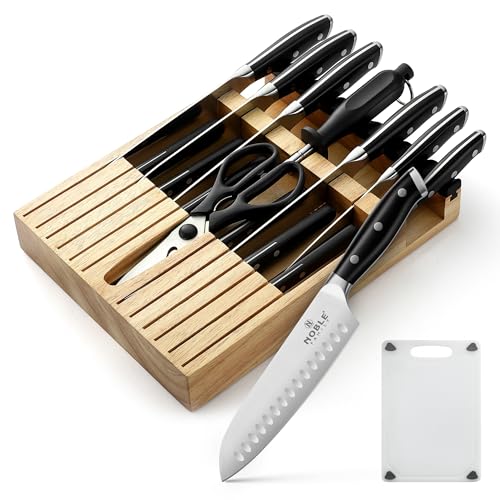CableReady
Member
Hi, I have recently been learning to sharpen on a Shapton Pro 1000, and as I'm getting better I'm looking to add a stone or two. My knives are mostly soft steel, with the exception of an Aogami Super Nakiri (my first Japanese knife). My knives are:
Victorinox Swiss Modern 8" chef's knife
Victorinox Swiss Modern paring knife
Kiwi #22 (basically a large Nakiri—I got it as a cheap way to test out the profile)
Shiro Kamo Aogami Super Tall Nakiri
These are all fairly new. The Nakiri is a sort of "test run" at carbon steel. At some point down the line after I've determined whether I mind the extra maintenance for carbon steel, I will add a 240mm Gyuto in either carbon or a harder stainless steel.
I've been learning to sharpen on the Kiwi and the Victorinox. Though I still struggle somewhat with the tip of the chef's knife, I finally felt comfortable enough yesterday to try sharpening the Shiro Kamo Nakiri and I had pretty good success! In many ways it was easier to sharpen than the others. The biggest difficulty was getting the curve at the tip as sharp as it was out of the box (I did not succeed at this). I suppose that'll come with more practice.
Anyway, I am interested in adding a few stones to my SP1000, in the following order:
For now, as I continue to develop my sharpening skills, I was thinking I'd prioritize a touch up and/or finishing stone, and only buy a coarse stone when it comes time to do thinning, but I am open to being persuaded otherwise. What would you recommend for me? (If it matters at all for determining the level of polish I might want, all my cooking is vegetarian—no meat or fish, and lots of veggies and tofu.)
Victorinox Swiss Modern 8" chef's knife
Victorinox Swiss Modern paring knife
Kiwi #22 (basically a large Nakiri—I got it as a cheap way to test out the profile)
Shiro Kamo Aogami Super Tall Nakiri
These are all fairly new. The Nakiri is a sort of "test run" at carbon steel. At some point down the line after I've determined whether I mind the extra maintenance for carbon steel, I will add a 240mm Gyuto in either carbon or a harder stainless steel.
I've been learning to sharpen on the Kiwi and the Victorinox. Though I still struggle somewhat with the tip of the chef's knife, I finally felt comfortable enough yesterday to try sharpening the Shiro Kamo Nakiri and I had pretty good success! In many ways it was easier to sharpen than the others. The biggest difficulty was getting the curve at the tip as sharp as it was out of the box (I did not succeed at this). I suppose that'll come with more practice.
Anyway, I am interested in adding a few stones to my SP1000, in the following order:
- a "touch-up" stone that (hopefully) can be used weekly on all my knives, and for finishing on my soft steel knives,
- Shapton Pro 2000? I've read excellent things about this stone. But would it be too coarse of a touch-up stone for my Nakiri (and future Gyuto), and too close to what I already have?
- Shapton Glass or Rockstar 3000? Perhaps this could double as a finishing stone. But would this be too fine for touch-up on my soft steel knives?
- a finishing stone for my Nakiri (and whatever Gyuto I end up getting),
- Shapton Glass or Rockstar 3000? Perhaps this could double as the touch-up stone. But would this be too coarse for an ideal finish on my hard knives?
- Shapton Glass or Rockstar 4000, or 6000?
- a coarse stone for when it comes time to do thinning, down the line.
- 220 or 320? Shapton Pro, Glass, or Rockstar?
For now, as I continue to develop my sharpening skills, I was thinking I'd prioritize a touch up and/or finishing stone, and only buy a coarse stone when it comes time to do thinning, but I am open to being persuaded otherwise. What would you recommend for me? (If it matters at all for determining the level of polish I might want, all my cooking is vegetarian—no meat or fish, and lots of veggies and tofu.)
























